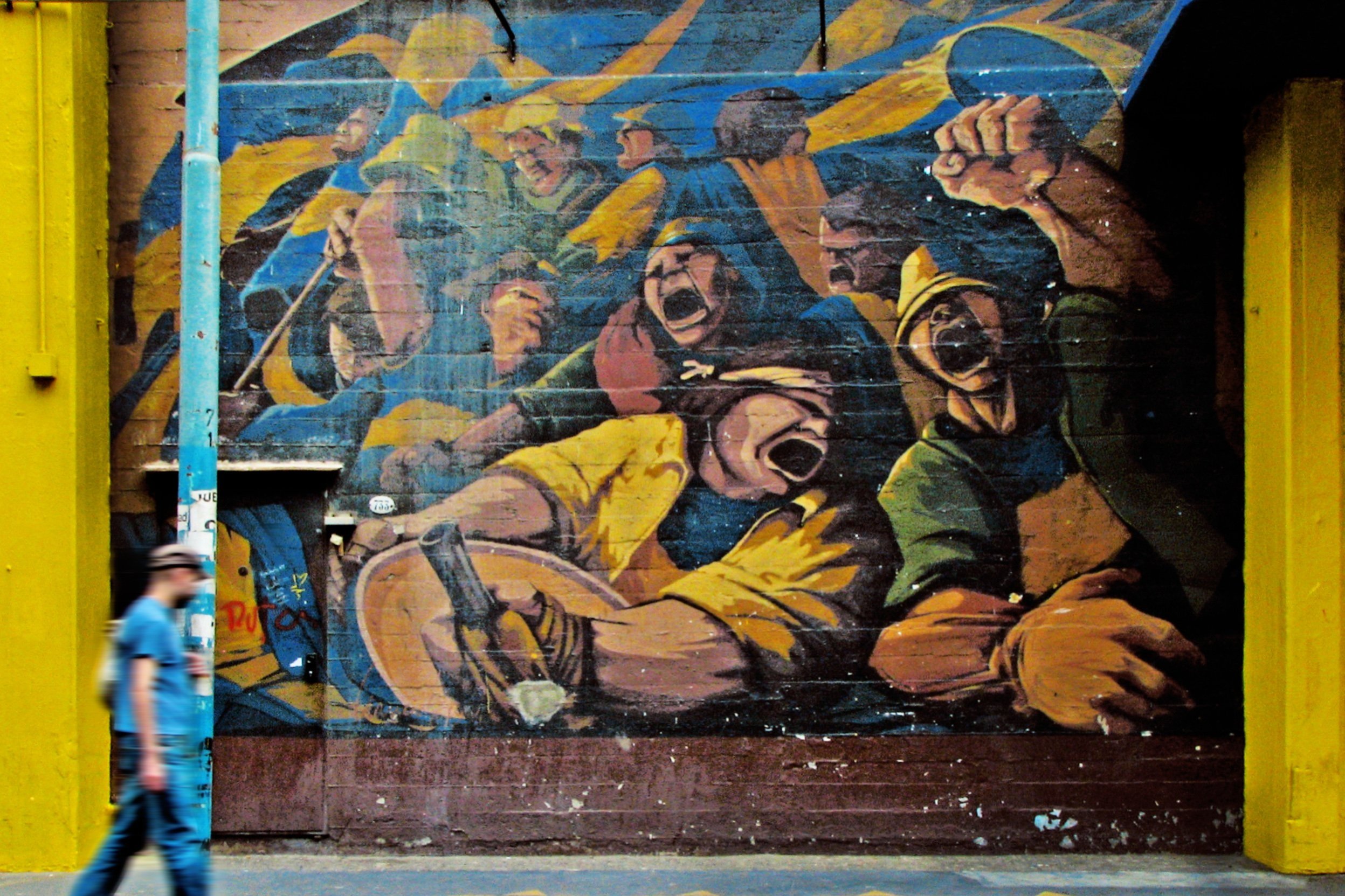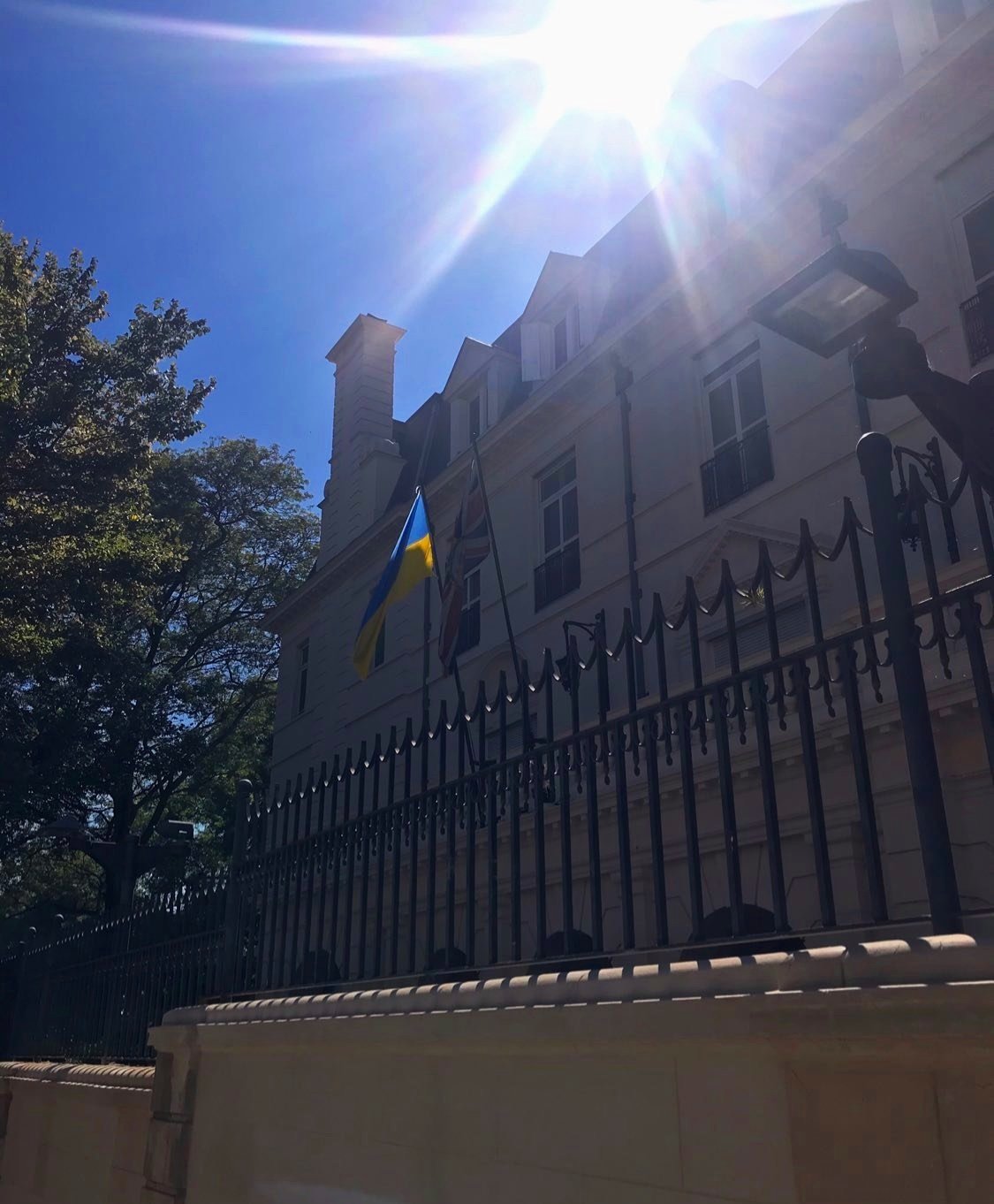12,000 Miles from Chernobyl
by Dominic Hilton
June 2022
From Buenos Aires, Dominic Hilton on escaping the threat of nuclear annihilation.
My apartment in Buenos Aires overlooks the British Ambassador’s Residence, a handsome Edwardian mansion boasting the largest private gardens in the city. In 2001, the building was designated a National Historic Monument of Argentina, but for me, it is an unwelcome reminder of home, a place I came here to escape, in an artless sort of way.
“Look at it like this,” my friend Lara consoled me a few months ago, “in the event of any emergency, at least you can abseil or parachute off your balcony ledge and land safely on British soil. I can’t do that from my apartment.”
“Plus, you’re not British,” I reminded her.
A hawk swept majestically into one of the garden’s ‘drunken stick’ trees below us. “Oh… you know what I mean,” Lara said.
On February 24, 2022, the day the Russian army invaded Ukraine, the façade of the Ambassador’s Residence was lit up blue and yellow, the colors of the Ukrainian flag. The gesture was made “in solidarity with the people of Ukraine,” according to an official statement by the British Embassy in Argentina—the only problem being that blue and yellow also happen to be the colors of Boca Juniors, one of the capital’s beloved soccer teams.
In the weeks that followed, I watched a steady stream of pedestrians shy to a halt outside the mansion gates to exclaim “BOCAAAAA!!!” before snapping jubilant photos with their phones. One sunny day in late summer, I walked out of the lobby of my building to see an attractive couple in sports gear looking up at the flagpoles, where the flag of Ukraine was now flying alongside the Union Jack. The man pointed a finger as he shielded his eyes with his other hand.
“What is it?” asked his wife.
“The flag of Ukraine,” he told her.
“Oh? Why?”
He shifted his gaze back to his spouse, pausing for a second before he said, “Because there’s a war going on there.”
“Really?” she said, turning her back on him.
I couldn’t tell if the woman was joking or not, but her husband eyeballed her glumly as she began to take multiple, trout-faced selfies, using the radiant white brick mansion as a backdrop for her priorities, which were clearly a long way from Donetsk and Kharkiv.
Her attitude reminded me of Argentina’s government, which initially failed to condemn Russia’s brutal invasion. Only later, when the international pressure became intolerable, did it finally mutter a few half-assed platitudes about peace and harmony. In the lead-up to the war, President Fernandez chose to visit Vladimir Putin in Moscow, telling the dictator that “Argentina must be the gateway” for Russia in Latin America. Friends overseas delighted in bringing this up in emails and on WhatsApp, asking how it made me feel to live in a country so plainly on the wrong side of history. “Not great,” I told them, though in truth I was perfectly happy to be here. Not because I supported Argentina’s position on the unfolding war. I just appreciated my adopted home being located at the bottom of the world, where nobody ever gives it much mind.
“Think of it this way,” my Norwegian friend Alex said to me one evening outside a bar, “Buenos Aires is 12,000 miles away from Chernobyl.”
It was gone midnight, and we were a few streets away from my apartment, drinking beer beneath the towering mausoleums of the Recoleta cemetery. I’d asked Alex about his family back in Norway and whether they were scared of nuclear annihilation.
“My family are worried,” Alex told me, stroking his beard, “but they’re also not afraid of dying.”
“Oh, that’s such a Scandinavian answer,” I said, only half knowing what I meant.
I’d heard similar things from other friends here. Their families back in Europe don’t know whether to keep calm and carry on, or to start frantically digging fallout shelters.
“Believe you me,” she said, jabbing a finger at the phone camera like a latter-day Lord Kitchener, “this batty old Englishwoman can make a mean Molotov cocktail.”
Alex and I have been saying for years that, despite all outward appearances, globally-speaking, Argentina is way ahead of the curve. “You see?” Alex now said, leaning back in his chair, a gratified look filling his face. “This is the country of the future—though Ushuaia is probably a better bet than Buenos Aires.”
“Tell that to my mother,” I said, who lives back in England, and is forever ragging on the “godforsaken” nation her son has chosen to live in.
Not that she lets up on the Russians. “They’re silly little boys and they need to shut up and go home before I spank their backsides blue,” she told me on a recent video call, adding that she’ll be “perfectly fine” should Putin’s troops ever advance on the English home counties. “Believe you me,” she said, jabbing a finger at the phone camera like a latter-day Lord Kitchener, “this batty old Englishwoman can make a mean Molotov cocktail.”
The news left me shaken, and I pictured her flipping through the boxes of old-fashioned recipe cards she keeps in her kitchen until she got to ‘M’.
A week after meeting Alex outside the boneyard, the pair of us went barhopping with a group of friends until sunrise. We ended up in a cocktail lounge ranked 21 in a list of The World’s 50 Best Bars, where lavish chandeliers hang threateningly from the ceiling and pokerfaced barmen pretend not to hear your orders. It was a weeknight, but the place was pungent and heaving, principally with stunning, high-end sex workers of indeterminable gender. We got talking with a group of women from Córdoba who were visiting Buenos Aires for a week-long hen party. One of the women called over my friend Ciro and began flirting shamelessly with him. She toyed suggestively with the zipper on his windbreaker, and the first thing she said to him was, “You look just like Vladimir Putin.”
Ciro gave her the finger, and she said, “No, no, that’s a good thing. I mean it as a compliment. Remember, the majority of Argentines support Putin, so with your looks you’re going to do well out of this war.”
Ciro was baffled, not least because he looks nothing like Vladimir Putin.
*
Recently, I attended a party at the Ambassador’s Residence, where one of the Embassy staff mentioned the shit they’d been getting thanks to their show of support for Ukraine.
“To take one example,” the staffer said, flourishing his champagne flute, “the other day, I was accosted by two Russians outside the Embassy entrance. They were really irate, these guys, and they demanded an explanation for why we were flying the Ukrainian flag. I tried to give them one, but I had a car waiting for me, so I don’t think I left them satisfied.”
Months after it was first raised, the flag of Ukraine was finally lowered on the Ambassador’s Residence just the other day, replaced by an LGBT+ rainbow flag to mark International Day Against Homophobia, Biphobia and Transphobia. Standing on my balcony, riddled with Covid-19, I watched a homeless man shuffle across my plaza. He was smoking a roll-up cigarette, which he placed very deliberately, still lit, on the perimeter wall of the mansion. Then he trundled several meters towards the Embassy’s large recycling bin and climbed inside. I stood out there for ten or so minutes, waiting for him to re-emerge, but he didn’t.
After that, I went inside and turned on my TV. Vladimir Putin was ranting. Russians who live and work overseas are scum and traitors, he said, and I wondered if I, too, was nothing better than scum, a traitor to my own country. After all, I live overseas, where I spend my days doing third-rate impressions of my Head of State on a podcast.
But instead of worrying about it too much, I switched channel. I was feeling rank, and Elizabeth Taylor was parading around a hotel room in her silk negligee. After all, I told myself, if the last world war is anything to go by, once this one is over, Putin and his cronies will end up down here with me, hiding in Argentina.



